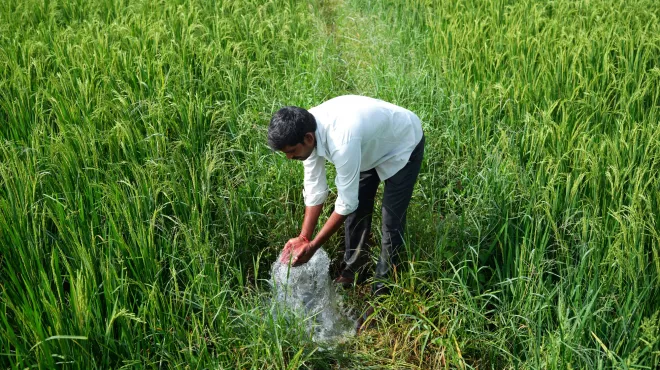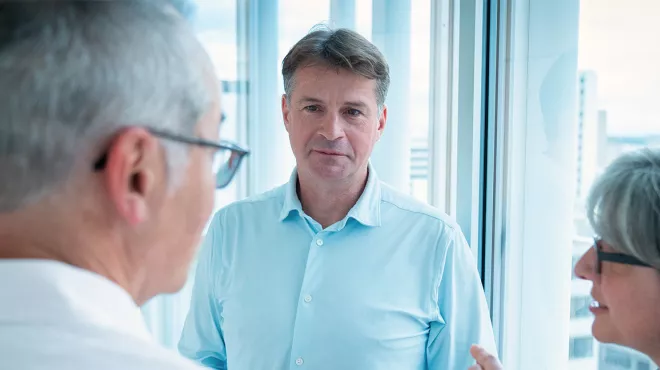Read an important program update below this story.
It was the early '90s, and a medical student in Caracas, Venezuela, named Florencia Segal was attending rounds at a state hospital as part of her training. She was struck by the number of patients with opportunistic infections due to acquired immunodeficiency syndrome (AIDS) and the grim picture that they faced. There were no effective therapies available to treat the roots of their disease.

Segal, who now designs clinical trials for the Novartis Institute for Tropical Diseases (NITD), vividly recalls that moment. It spurred her to specialize in infectious diseases, beginning with human immunodeficiency virus (HIV), which causes AIDS. And now – 25 years later – she’s doing everything in her power to battle the coronavirus pandemic. She was recently instrumental in planning a large, Phase III clinical trial to test if a compound called hydroxychloroquine can help hospitalized patients with COVID-19 disease.
After receiving her doctorate in medicine, Segal completed her infectious disease training in the United States in Boston, Massachusetts, where she treated patients with HIV in addition to conducting research. By that time, effective antiviral therapies had been developed for HIV, and AIDS was no longer a death sentence. Segal hopes that the scientific and medical community can identify effective treatments for COVID-19 in weeks or months. One promising strategy is to repurpose existing treatments for the disease.
Enter hydroxychloroquine, which has long been used for the treatment of malaria and certain autoimmune diseases.1 Although the compound has been in the news with preliminary studies, it hasn’t been put to the test for COVID-19 disease through a rigorous, randomized, placebo-controlled study. Until now.
The cross-unit project team asked Segal to help lead the design of the hydroxychloroquine trial because of her deep knowledge of infectious diseases and antiviral drug development. Following are excerpts from a conversation with Segal, who is an Executive Director in Translational Medicine at the Novartis Institutes for BioMedical Research (NIBR), which includes NITD.
It is critical to find out if potential treatments work through randomized, placebo-controlled studies. We can defeat this pandemic only with science.
Florencia Segal
Why design this new study?
A pandemic brings a lot of unfounded assumptions and speculation. This is why we are joining forces with the global research community to bring rigorous science to bear on the current situation. There is no guarantee that any medicine, including hydroxychloroquine, will prove safe and effective in hospitalized patients with COVID-19 disease. But it is critical to find out if potential treatments work through randomized, placebo-controlled studies. We can defeat this pandemic only with science.
Can you give us a sense of how quickly the team moved?
Typically it takes months to design a Phase III trial and engage with the required health authorities. In mid-March, a Novartis COVID-19 R&D Task Force was formed, and I was part of the group evaluating our portfolio of medicines for potential clinical investigations. In a meeting with Novartis leaders, a decision was made to conduct the hydroxychloroquine study. Within an hour I had written the first draft of the study synopsis, and just three hours later we had assembled a cross-functional team around it. Within three to four days we had a full study concept that we were able to share with the health authorities, within two weeks we had a final study protocol, and within three weeks we had permission from the US Food and Drug Administration to go ahead with the study.
How were you able to design this trial in such a short time?
Definitely thanks to the strong commitment and sense of urgency of the Novartis team as well as the external investigators and health authorities. This enabled us to quickly interact with each other and make decisions. We were also able to leverage deep expertise in drug development at Novartis as well as our global footprint to accelerate timelines. Some of us are located on the East Coast of the US, while others are based in Basel, Switzerland, so we were effectively working 24 hours a day. When we were sleeping in the US, our counterparts in Switzerland were working and vice versa.
What are your hopes in this moment?
I believe that science and technology will deliver vaccines and therapies to treat patients with COVID-19 and that we will be able to overcome the current crisis. Never before have I seen this degree of collaboration both within organizations and across organizations and sectors. People are coming together with a common goal and a sense of urgency. That makes me very hopeful.



